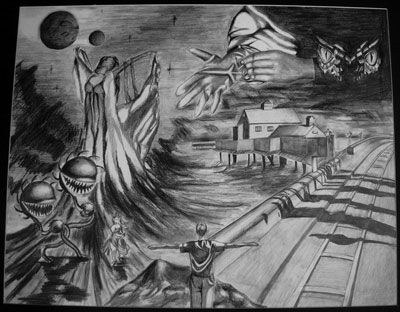All Nonfiction
- Bullying
- Books
- Academic
- Author Interviews
- Celebrity interviews
- College Articles
- College Essays
- Educator of the Year
- Heroes
- Interviews
- Memoir
- Personal Experience
- Sports
- Travel & Culture
All Opinions
- Bullying
- Current Events / Politics
- Discrimination
- Drugs / Alcohol / Smoking
- Entertainment / Celebrities
- Environment
- Love / Relationships
- Movies / Music / TV
- Pop Culture / Trends
- School / College
- Social Issues / Civics
- Spirituality / Religion
- Sports / Hobbies
All Hot Topics
- Bullying
- Community Service
- Environment
- Health
- Letters to the Editor
- Pride & Prejudice
- What Matters
- Back
Summer Guide
- Program Links
- Program Reviews
- Back
College Guide
- College Links
- College Reviews
- College Essays
- College Articles
- Back
Henry David Thoreau vs. Martin Luther King Jr. Argument Analysis
Reform is the one constant in human development. In fact, without change, development is an impossibility. However, it is sometimes the work of individuals that causes the most lasting and widespread reform. In the cases of Martin Luther King Jr. and Henry David Thoreau, while each had their own vision for society, their central perspectives and how they portrayed them through their writing are significantly different.
In "Letter from Birmingham Jail" by King and "Civil Disobedience" by Thoreau, both argue in favor of civil disobedience; however, their reasons for such a claim stem from two very distinct causes. King lived in the context of a time when segregation and widespread racism was a norm in the southern United States. He approaches Birmingham with this cause in mind and is consequently detained following a civil rights demonstration. He writes his letter to the Birmingham clergy in order to communicate the evils of segregation and the reasons for his beliefs and actions in fighting for equality. On the other hand, Thoreau argues against the strength of government influence. His reason for disobedience lies in his lack of support for strong government whereas King is fighting against the mistreatment of African Americans.
Aside from their unique arguments, both King and Thoreau use their individual masteries of English rhetoric to make their points. To reinforce the idea that big government is flawed by nature, Thoreau employs tricolon. In line 21, he claims an overbearing governing body "...does not keep the country free...does not settle the West...does not educate." By organizing these three ideas in a way that stands out, Thoreau effectively emphasizes these complaints. The reader can easily discern the importance of these three facets of an imperfect government and gain a better understanding of what Thoreau is attempting to argue. Similarly, King utilizes biblical allusions to appeal to his audience's piety. The clergy believes that King's actions are misguided because they precipitate violence. To disprove this notion, King compares his mission to that of Jesus Christ asking "Isn't this like condemning Jesus because his unique God-consciousness and never-ceasing devotion to God's will precipitated the evil act of crucifixion?" (6). A god-fearing Christian clergy will never doubt the morals of Christ, and by making such a reference, King equates his own ethics to His - a masterful tugging of heartstrings on King's part. The emotional response he elicits from this allusion only bolsters King's claim.
The artful manipulation of the English language has infinite potential for those competent enough to know how to use it. Evidently, Martin Luther King Jr., a civil rights activist, and Henry David Thoreau, a Transcendentalist thinker, both wield the pen in order to craft formidable arguments in favor of civil disobedience.

Similar Articles
JOIN THE DISCUSSION
This article has 0 comments.

This was an assignment I was given my junior year of high school to compare and contrast the central messages of two very famous speeches. However, the assignment was more specifically assigned to pinpoint the exact ways these two individuals diverged in their unique styles.